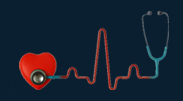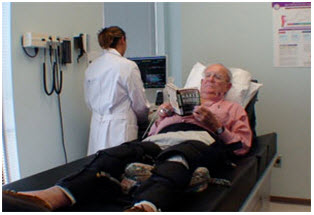




External CounterPulsation (ECP)
External CounterPulsation Therapy
• Treats Angina Without Surgery
• Medically Proven Effective
• Easier and Much Safer Than Surgery
• Painless Outpatient Procedure
• Covered by Most Insurance
• Results Can Last for Years
What is ECP (External Counterpulsation)?
ECP is a new, non-invasive, highly effective, low risk, and painless treatment for angina and coronary artery disease (blockages in heart arteries) which is:
• Clinically proven to be as effective as bypass surgery, angioplasty, and stents
• Extremely safe and without any of the risks or recovery time associated with surgery
• FDA-approved, Medicare-approved and covered by most insurance
• Administered in an outpatient setting, at a fraction of the cost of surgical alternatives
• Offered by leading medical centers including The Mayo Clinic, The Cleveland Clinic, Johns Hopkins Medical Center, Harvard Medical School, and The Miami Heart Institute.
How does ECP work?
ECP improves the flow of healthy, oxygenated blood to the heart by creating new blood vessels called collaterals, which serve as natural bypasses for blocked arteries, just like the surgeons do during bypass surgery.
How does ECP compare to other invasive procedures such as angioplasty and bypass surgery?
ECP can be a highly effective treatment for many patients with coronary artery disease. Unlike angioplasty or bypass surgery, ECP is far less risky and can be done on an outpatient basis. In a recent study, the five-year outcomes for ECP patients were virtually the same as for angioplasty and bypass patients.
How effective is ECP treatment?
Studies on ECP show that up to 85% of patients treated with ECP have:
• Significantly improved or completely eliminated their symptoms
• Significantly increased their physical stamina, exercise tolerance, and quality of life
• Significantly decreased their use of nitroglycerin and other heart medications
How long do the benefits last?
The benefits of ECP can last up to five years. Some patients may require repeat treatment one or two years later in order to maintain the improvement.
Are there any risks or side effects?
The most amazing fact about ECP is that it carries little or no risk. The only significant adverse effect reported is skin abrasion due to the high pressure applied to the legs during ECP treatment. ECP is one of those rare medical treatments which is highly effective yet with minimal side effects.
What happens during ECP treatment?
During the treatment:
• You lie comfortably on a special bed and a series of blood pressure cuffs are wrapped around your legs.
• Each EKG complex triggers the cuffs to inflate and deflate in sync with your own heart beat.
• During the heart’s resting phase, when it normally receives its supply of blood, the cuff inflates, pushing oxygen-rich blood toward your heart.
• Just before your heart begins to pump again, the cuffs deflate and blood leaves your heart without the muscle having to work as hard.
• Most patients read, listen to music, or sleep during the treatment.
How long is the ECP treatment?
To allow the heart to open up new blood vessels, it takes a total of 35 hours of ECP treatment. This can be accomplished in two ways: one hour a day, five days a week, for a total of seven weeks OR two hours a day, five days a week, for a total of three and a half weeks. Usually one course of treatment is sufficient for most patients but a few may require extra course of treatment due to the severity of their coronary artery disease.
Does ECP help with congestive heart failure?
ECP has clinically proven to be a safe and effective treatment for congestive heart failure. In fact, ECP is the only treatment that actually improves the function of the heart while other treatments simply provide management of symptoms. However, most insurance still consider ECP as experimental in the treatment of congestive heart failure and therefore coverage by insurance is quite limited at present.
Who benefits from ECP treatment?
ECP is particularly suited for the following groups of people:
• Those who have chronic angina despite taking a lot of medications
• Those who are not candidates for surgery or angioplasty due to their high risk for invasive procedures
• Those who do not want to undergo surgery, angioplasty, or stents
• Those with small or diffuse disease (often women or diabetics) that are not amenable to bypass surgery or angioplasty
• Those who have exhausted invasive treatments without lasting relief of symptoms
• Those who want to explore less risky alternatives to bypass surgery or angioplasty
What are the advantages of ECP over other conventional treatment?
ECP is better than invasive treatment in the following ways:
• It can be done in an outpatient setting without hospitalization.
• It’s very safe with minimal side effects and can be safely done even in very sick patients.
• It’s effective for small heart vessels that are too small for bypass and angioplasty.
• It’s cost effective, non-invasive, painless, and with no recovery time as compared to bypass surgery, angioplasty, or stents.
Does ECP treatment interfere with my work or social life?
ECP treatment does not interfere with either your work or social life. Other than the one or two hours each weekday that you spend on the treatment, you continue to live your life as you have been doing. In fact, most patients will be able to do more of what they have been doing in the past due to the significant increase in their physical stamina.
When will I notice the improvement?
Usually the patients start to notice the improvement after 15-20 days of ECP treatment. The improvement will include marked decrease in attacks of angina, increase in how far they can walk, less use of nitroglycerin and feeling more energized.
Where else is ECP performed?
ECP is performed at hundreds of locations throughout the U.S. as well as around the world. Here is a partial list of U.S. facilities that perform ECP:
• The Mayo Clinic
• The Cleveland Clinic
• Beth Israel Medical Center
• Johns Hopkins Medical Center
• The Ochsner Foundation Hospital
• The University of Virginia
• Emory University
• The University of California
• The Miami Heart Institute
Who are we and what is our experience with ECP?
We were the first facility in Monmouth County using the CardioAssist ECP treatment protocol. We have been actively treating patients with ECP since 2008. We are the most experienced CardioAssist ECP center in Monmouth County. We will only treat patients who are candidates for this therapy. If surgery or angioplasty is the better choice for you, this treatment would not be recommended.
If you would like more information about our ECP Program or for an evaluation to see if ECP therapy is right for you call us today at 732-264-3131 for an appointment.
Better Heart Health
Board Certified in Cardiology & Internal Medicine and Committed to
Prevention, Risk Factor Modification, Early Detection and Prompt Treatment!
The Keys to a Healthy Heart
Trust a Board Certified Physician to help You Achieve & Sustain Optimim Heart Health
Joseph A. Sarnelle MD | 812 Poole Ave. Suite C Hazlet, NJ 07730 | 732-264-3131
Copyright 2010 Joseph A. Sarnelle, MD: Cardiology New Jersey. All Rights Reserved.
